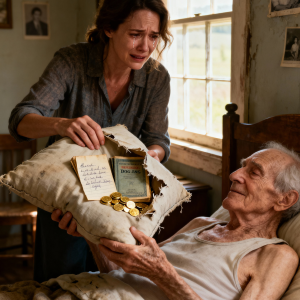
It was another Monday morning at St. Augustine Medical Center in Denver. Doctors hurried between departments, nurses checked charts with quick steps, and the phones at reception rang without pause. The rhythm of the hospital was relentless and predictable, until something happened that silenced the entire lobby.
The glass doors opened and a German Shepherd walked in. Balanced across his back was a young girl, pale as snow, her arms hanging limply by her sides. The sight was so shocking that even the most hurried doctors froze mid-step. The sound of the dog’s claws striking the floor echoed through the wide room, louder than the phones, louder than the conversations, as if demanding everyone’s attention.
The animal’s eyes were fixed and urgent. They were not fierce, not wild, but pleading. His gaze seemed to beg the humans in front of him to understand the danger. A nurse named Isabel stepped forward carefully, her voice soft and steady.
She said, “It’s all right, boy. I want to help her.”
The Shepherd released a low growl, trembling more with fear than aggression. He stood his ground protectively until Isabel came close enough. After a pause, he shifted his weight and allowed her to lift the girl into her arms. The child’s skin was icy cold and her body frighteningly light.
“Pediatric emergency!” Isabel cried, and instantly the entire hospital burst into motion. A stretcher appeared, monitors were wheeled in, and a team of doctors surrounded the child.

The dog followed at their heels, nails clicking on the polished tiles. A guard attempted to stop him but then hesitated when he noticed the dog’s intent focus on the girl. He was not running wild, he was protecting. No one had the heart to pull him away.
Inside the trauma unit, the girl’s pulse was thread-thin and her breathing shallow. Outside the door, the Shepherd whimpered and scratched each time he was shut out. Moved by his cries, one of the doctors finally allowed him in. He lowered himself onto the floor beside her bed, his eyes fixed on her small body, as if his will alone could keep her alive.
Nobody knew her name. She carried no identification, no backpack, no family running behind her. Security footage later revealed the Shepherd emerging from the forest nearby, the girl draped across his back, walking with uncanny certainty straight to the hospital doors. He had not wandered. He had chosen.
Police and forest rangers followed the trail back into the woods. They discovered a campsite torn apart: a collapsed tent, a smoldered fire pit, food wrappers, and a rag stained with blood. In the dirt lay a tiny sneaker, matching the one still on the girl’s right foot. Something terrible had taken place there.
Back at the hospital, the child remained in critical care. The Shepherd, quickly named Orion by staff, refused to leave her side. He ate little, drank when urged, but would not move farther than a few feet from her bed. His watch was constant, his body tense as if he might be called to defend her again at any moment.
At dawn, when the first light touched the blinds, the girl stirred. Her eyelids fluttered open, and she whispered faintly, “Orion.”
The dog raised his head and pressed his nose gently against her hand, exhaling a long sigh of relief.
When her strength slowly returned, she told the truth. A man had lured her by claiming to be her uncle. At first he was friendly, but soon his tone became harsh and his actions violent. She tried to resist, but exhaustion and fear overwhelmed her. Orion had fought to protect her, and when she lost consciousness he carried her through the woods until he found the hospital.
Doctors confirmed the story with grim expressions. She had fractures, deep bruises, and clear evidence of abuse. One surgeon whispered to another, “If she had arrived half an hour later, she would not be here.”
Police arrested the man quickly. He still carried the girl’s belongings in his backpack. News headlines across the country told the story: “German Shepherd carries child into hospital and saves her life.”
Because no family members could be found to take immediate custody, the girl was placed in foster care. Yet she made one request in a voice that was soft but unshakable. “Orion has to come with me.” No one dared to refuse her.

From that moment on, the dog never left her side. He followed her to meals, guarded her bed at night, and walked with her through every stage of recovery. The hospital staff later held a small ceremony, tying a crimson ribbon around Orion’s neck as doctors and nurses clapped in unison.
Months later, Orion was nominated for the National Animal Valor Award. He had never been trained as a rescue dog, never carried any official title, yet his loyalty and courage saved a life.
For the girl, no medal mattered. Orion was not only her rescuer. He was her family.
And what this story teaches is simple. True loyalty does not need instruction, and love does not require recognition. Sometimes the bond between a child and a dog can carry enough strength to break through fear, danger, and even the shadow of death itself.



